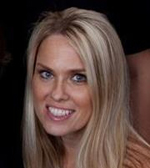
Teresa Barnes
Most physicians are familiar with the feeling of gratification that comes from knowing their work is helping dozens, or even hundreds, of people. But as Teresa Barnes knows all too well, when you have a chance to use your work to help your family, that feeling takes on a new dimension.
As the vice president of outreach and program support for the Coalition for Pulmonary Fibrosis and chair of the ATS Public Advisory Roundtable, Ms. Barnes supports pulmonary fibrosis (PF) patients and disseminates information to the public and others seeking to understand the insidious disease.
She is more than just a patient advocate, as her own life has been touched more than once by PF: since 1996, she has lost her father, three uncles and an aunt (all siblings) to PF.
“When my dad was diagnosed at Duke Medical Center, it was as if he had died already,” Ms. Barnes recalled. “Being given a diagnosis which is, in effect, a death sentence, sends patients, caregivers and families into a tailspin and a battle with grief much like when a person suddenly dies. It was heart wrenching for me and my family.”
At the time, she and her family were unaware of the disease’s possible genetic origin. It was not until 2001, five years after her father’s death, that her uncle was diagnosed and the family came to understand that the disease may have a familial connection.
“At first, I think we were in denial–and some family members still are, despite the fact that 100 percent of the previous generation on my father’s side has died from the disease in 15 years,” she said.
To help other families faced with PF find information and support, Ms. Barnes became a founding board member of the CPF along with a team that included ATS members Talmadge King, MD, David Schwartz, MD, Marvin Schwarz, MD and Gregory Tino, MD. The CPF, which was founded by Mark A. Shreve, also benefited from the expertise of Celeste Belyea, June Richmond and David Cory, who also served as founding board members.
“When I met the group starting the CPF, they were looking for help with the patient/family perspective on the disease and I had it,” said Ms. Barnes, who served on the CPF board of directors prior to joining the staff fulltime in 2005. “I was looking for a way to help patients and families get through their experience with PF. When my father was diagnosed, ill and dying, my family and I had no resources and no one to turn to for help. I wanted desperately to change that for others. And I have a vested interest in finding answers: my life and the lives of my family members, including my daughter, depend on my work, and that is hugely motivating.”
As a PF advocate, Ms. Barnes has become involved in other projects, including serving as the chair of the ATS PAR and, more recently, as a member of the ATS Presidential Commission on Patient Involvement.
Beyond the ATS, Ms. Barnes is involved in the Westie Foundation of America, a group that is exploring the possible link between PF in humans and canines.
“As it turns out, the West Highland Terrier (Westie) and many other terriers and other breeds of dog are at risk for developing pulmonary fibrosis, and in the Westie, it appears that the disease is very similar to the disease that affects humans,” said Ms. Barnes, who works to raise awareness of how canine health can impact human health in a positive way as a member of the WFA Board of Directors.
Ms. Barnes said one focus of her career is to ensure the patient perspective is not lost in the barrage of information involved in clinical trials and drug and device approvals, a role she says is especially critical when treatments are few or non-existent.
“Patients can offer clues that can help to better understand a disease—if the scientific community will just listen to them,” she said. “When I speak with patients and ask questions, I find interesting things about them that could provide some help in clinical trials and research. The problem is that patients are not usually asked to participate beyond the objective data collected regarding drugs and devices.”
When the workday is done, Ms. Barnes enjoys the time she spends with her family, including her husband, Dr. John Tosi, as well as her one-year-old daughter, stepdaughter and stepson, twin sister, brother and mother.
“I have grieved far more than I’d like to recall because of lung disease, and I feel that my life’s work is to expand my role in the future to improve lung health for patients and families worldwide,” said Ms. Barnes, who is working on a book about PF. “I’m happy to have a job at the CPF that is also my passion and live for the day that there is a treatment and a cure for PF so I can go back to being a full-time writer and journalist. Right now, the cause needs me more.”

